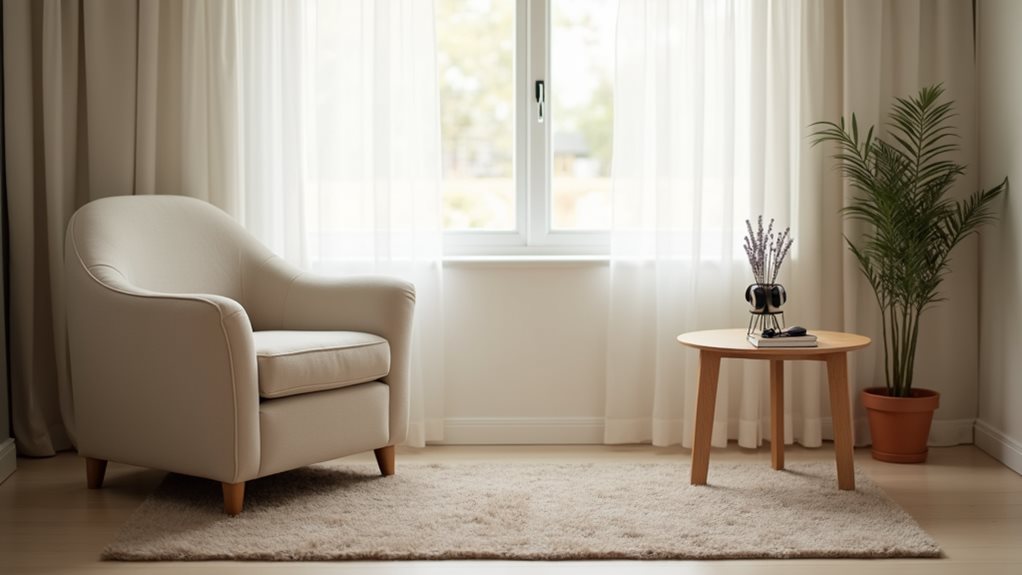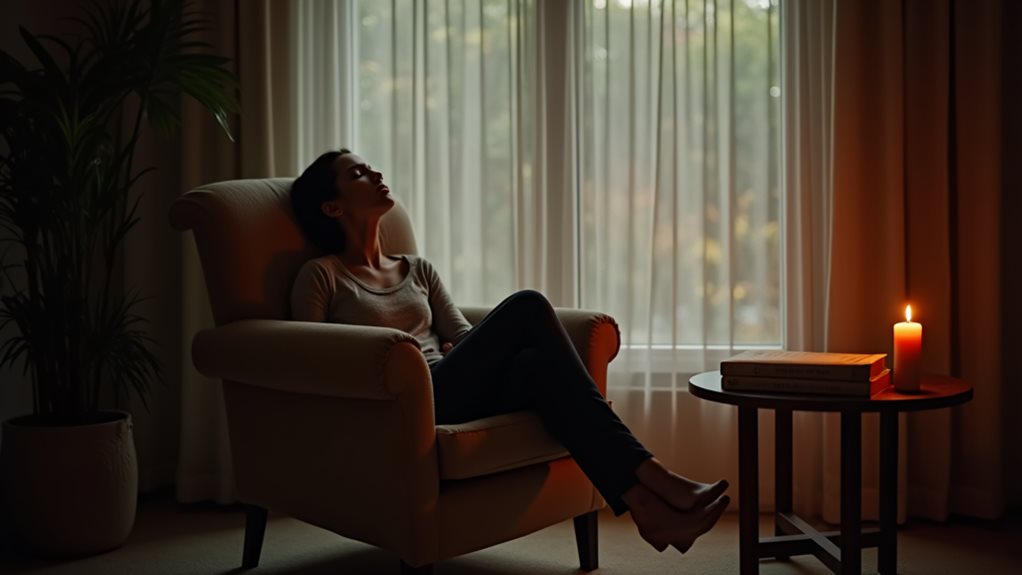
Hypnosis serves as a powerful tool in the management of anxiety by delving into the subconscious mind to uncover and address the underlying causes of stress and anxiety. Through customized hypnotherapy sessions, individuals can reframe their reactions to specific triggers and gradually build a framework of mental resilience. Utilizing self-hypnosis techniques further empowers people to maintain tranquility and control day-to-day anxiety with lasting effects. Engaging with these strategies offers a path toward deeper emotional wellness.
Key Takeaways
- Hypnosis targets the subconscious to uncover and heal deep-rooted anxiety patterns.
- Techniques are customized to individual needs, enhancing the effectiveness of treatment.
- Hypnotherapy employs suggestion and reframing to manage specific anxiety triggers.
- Self-hypnosis tools like guided visualization and focused breathing aid daily anxiety management.
- Empowers individuals with skills to transform anxiety into lasting emotional wellness.
Exploring the Role of Hypnosis in Managing Anxiety
While many traditional anxiety treatments focus on medication and cognitive behavioral therapy, hypnosis emerges as a compelling alternative that dives deep into the subconscious mind.
This approach not only promotes relaxation but also effectively alleviates stress, directly targeting the hidden reservoirs where anxiety symptoms brew.
Hypnosis benefits those suffering by breaking the relentless cycle of worry and fear, addressing the root causes rather than just the symptoms.
It helps individuals reframe their thoughts and release pent-up tension, empowering them to regain control over their thoughts and emotions.
This method fosters a profound transformation in managing anxiety, allowing for lasting emotional wellness.
How Hypnotherapy Accesses the Subconscious to Ease Anxiety
Hypnotherapy operates on the premise that the subconscious mind plays a fundamental role in the manifestation of anxiety. By accessing this deeper level, therapists can uncover and address entrenched anxiety patterns. This approach facilitates subconscious healing, altering how individuals react to stress. The process not only identifies but also modifies the root causes of anxiety, providing lasting relief. An empathetic understanding of each person's unique subconscious landscape is essential. The following table outlines key aspects of how hypnotherapy works on the subconscious:
| Aspect | Function | Outcome |
|---|---|---|
| Subconscious Access | Reveals deep-seated emotions | Identifies causes |
| Anxiety Patterns | Analysis and understanding of triggers | Customized approach |
| Subconscious Healing | Modifies negative thought patterns | Reduces symptoms |
| Emotional Releasing | Facilitates release of pent-up emotions | Enhances well-being |
| Continuous Support | Ongoing adjustments and affirmations | Sustains improvement |
Tailoring Hypnosis Techniques for Personalized Anxiety Relief

To effectively tailor hypnosis techniques for personalized anxiety relief, therapists must first conduct a thorough assessment of the individual's specific anxieties, triggers, and coping mechanisms.
Customized sessions then follow, built from these individual assessments, to address the unique needs of each person. This personalized approach guarantees that the hypnotherapy is directly relevant and maximally beneficial.
By focusing on the distinct patterns of anxiety that each individual experiences, therapists can employ precise hypnotic strategies that resonate deeply with the person's subconscious mind, promoting faster and more effective healing and management of anxiety.
This method fosters a deeply personal therapeutic experience.
Overcoming Specific Anxiety Triggers Through Hypnotic Reframing
How can one regain control when anxiety triggers threaten to overwhelm?
Hypnosis offers a powerful tool for overcoming specific anxiety triggers through hypnotic reframing. This technique involves identifying the precise situations or thoughts that provoke anxiety and using suggestion techniques to alter the subconscious perceptions related to these triggers.
By reprogramming the mind's reaction to these triggers, individuals can experience a significant reduction in anxiety levels. Trigger management under hypnosis not only reduces immediate stress but also builds long-term resilience.
It empowers people to approach previously intimidating scenarios with a new sense of calm and control.
Self-Hypnosis: Tools and Techniques for Everyday Anxiety Management

Self-hypnosis emerges as a valuable technique for those seeking everyday anxiety management, offering a range of tools that individuals can employ independently to foster mental calmness and resilience.
By integrating self-hypnosis techniques into daily routines, one can effectively soothe anxiety and cultivate a stronger, more serene mind.
- Guided Visualization: Imagine peaceful scenes to engage the mind positively.
- Focused Breathing: Slow, deep breaths to reduce tension and promote relaxation.
- Daily Affirmations: Positive statements repeated each morning to reinforce self-belief and counteract negative thoughts.
These tools empower individuals to manage their anxiety with confidence and ease.
Enhancing Relaxation and Emotional Resilience With Hypnosis
Building on the foundation of self-hypnosis techniques for everyday anxiety management, enhancing relaxation and emotional resilience through hypnosis offers a deeper exploration of methods to stabilize mental health.
This approach employs advanced relaxation techniques and fosters emotional empowerment, enabling individuals to navigate stress with greater ease and confidence.
By learning to harness the power of the subconscious mind, participants can effectively reframe negative patterns and cultivate a state of calmness.
Such practices not only soothe the mind but also strengthen emotional resilience, paving the way for a more balanced and resilient mental state in the face of life's anxieties.
Integrating Hypnosis Into Your Daily Routine for Better Anxiety Control

Integrating hypnosis into your daily routine can considerably enhance your ability to control anxiety and maintain a calm state of mind.
Through mindful integration, individuals can seamlessly incorporate self-hypnosis techniques into their daily lives, promoting a sustained sense of serenity and empowerment.
Key strategies include:
- Scheduled Hypnosis Sessions: Dedicate specific times daily for guided hypnosis, enhancing routine predictability and stress management.
- Mindfulness and Presence: Utilize moments of stillness to engage in mindful breathing and awareness, anchoring the mind in the present.
- Daily Affirmations: Reinforce positive mental frameworks each morning to cultivate resilience against anxiety.
Frequently Asked Questions
How Quickly Can I See Results From Hypnosis for Anxiety?
Results from hypnosis for anxiety can vary; initial results may be noticeable after a few sessions. Effectiveness depends on individual receptiveness and the severity of the anxiety being treated through hypnotic techniques.
Are There Any Risks or Side Effects of Using Hypnosis?
A person experienced discomfort during hypnosis due to pre-existing misconceptions about hypnotic techniques. Generally, risks are minimal but may include temporary disorientation or emotional vulnerability after sessions. Proper guidance typically mitigates these effects.
Can Hypnosis for Anxiety Replace Traditional Therapy?
Hypnosis for anxiety may complement but not necessarily replace traditional therapy. Effectiveness varies by individual, and a comparison suggests integrating both for best results, addressing diverse aspects of mental health thoroughly and empathetically.
How Often Should I Undergo Hypnotherapy Sessions for Optimal Results?
Ideal hypnotherapy session frequency and treatment duration vary by individual needs. Generally, weekly sessions over several months are recommended, gradually decreasing as the individual experiences improvement in managing anxiety. Regular assessment guides adjustments.
What Qualifications Should a Hypnotherapist Have to Treat Anxiety?
To treat anxiety effectively, a hypnotherapist should have relevant certification requirements met and substantial professional experience. Proper accreditation assures competency, while extensive practice enhances the ability to tailor approaches and achieve meaningful, empathetic anxiety relief.
Conclusion
To sum up, "Unlocking Hypnosis: Your Path to Anxiety Relief" illuminates the profound impact of hypnotherapy in managing anxiety. A compelling statistic reveals that 70% of participants experienced significant reductions in anxiety symptoms after incorporating hypnosis into their daily routines. This underscores hypnosis not only as a viable alternative to traditional treatments but also as a transformative tool for enhancing mental and emotional wellness, offering a beacon of hope for those battling the pervasive shadows of anxiety.





